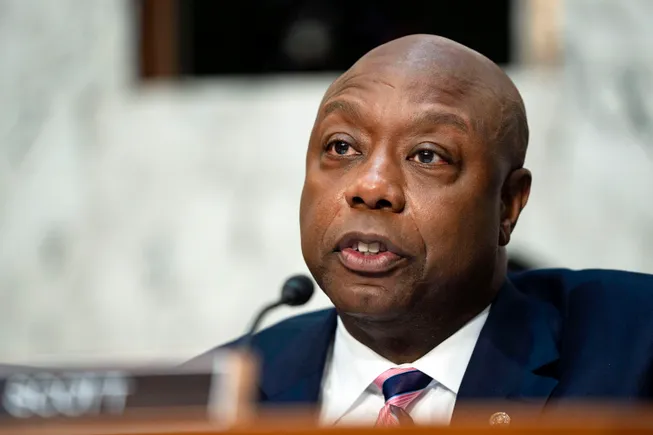Sen. Tim Scott, R-SC, is projecting early May for a full Senate vote on Jonathan McKernan’s nomination to lead the Consumer Financial Protection Bureau.
The Senate Banking Committee, which Scott chairs, voted last month to advance McKernan’s nomination as CFPB director, and a full Senate vote is “imminent,” the senator said Tuesday during the American Bankers Association’s Washington summit. That means it’s likely to occur in the next month or two, he said, noting Senate Majority Leader John Thune, R-SD, is ready to move more nominations through the Senate.
It’s been a tumultuous couple of months for the CFPB, as the bureau’s acting director issued a stop-work order, closed the agency’s headquarters and attempted to gut the consumer watchdog’s workforce. Going forward, Scott said the “smaller, the better” for the CFPB.
“Everything we can do to shrink the size of the CFPB, the better off the average consumer is,” he said.
The senator applauded Treasury Secretary Scott Bessent for quickly installing Russ Vought, the director of the Office of Management and Budget, as acting CFPB head, to shift gears at the agency.
The bureau’s attempts to let go of some 1,175 employees, however, faced pushback: A federal judge last month granted a preliminary injunction that halted the bureau from issuing any reductions in force and requiring the agency to reinstate employees fired since Feb. 10. The DOJ’s appeal of that decision was denied last week; the CFPB’s chief operating officer, Adam Martinez, has said the bureau was “never supposed to” employ “above 1,000 people.” The agency now employs about 1,700 staffers.
Shedding some light on the administration’s strategy to overhaul the CFPB before McKernan potentially takes the helm of the bureau, Scott said he thought there “was some consternation, honestly, in the system” because part of the challenge was that “we … wanted to shrink the CFPB down to the right size.”
“I think we wanted to get as much of that work done before we had a permanent guy come in and take it over,” Scott said. “And I do think we are at the point where it’s time to move forward.”
House Financial Services Committee Chair French Hill, R-AR, noted earlier Tuesday at the ABA event that he’s working closely with Scott, “both pushing back on the regulatory agenda but also crafting a legislative agenda.”
To “rein in” the CFPB, lawmakers are pursuing a combination of budget reconciliation to limit the spending and scope of the bureau, as well as “using our legislative authorities to try to get it on appropriation and have a bipartisan commission that oversees it,” Hill said.
Scott echoed those moves when he spoke later Tuesday. “Everything we can do to move the CFPB into the normal congressional process from a budgeting perspective and oversight is better for the American consumer,” Scott said.
Scott also touched on the legislation he introduced that’s meant to eliminate reputational risk as a metric regulators would use to gauge the safety and soundness of banks. He likened the issue to redlining, and applauded the Office of the Comptroller of the Currency and the Federal Deposit Insurance Corp. for both moving away from reputational risk.
He indicated he hopes the Federal Reserve, too, will get on board, with the nomination of Michelle Bowman for the vice chair for supervision role.
Scott said he sees a good chance of getting bipartisan support for the reputational risk legislation. While Operation Choke Point was “a very different conversation,” reputational risk may garner Democratic support, he said, as the Senate version of stablecoin legislation did recently with five committee Democrats.
Scott also detailed how his working relationship with the committee’s ranking member, Sen. Elizabeth Warren, D-MA – a frequent critic of the banking industry – differs from that with the panel’s previous chair, former Sen. Sherrod Brown, D-OH.
When Brown was chair and Scott was ranking member, “I was always in the dark,” the South Carolina Republican said. “With Elizabeth, believe it or not, while we are philosophically disjointed forever, she doesn’t surprise me very often.”
Although they disagree, Scott said he finds Warren “strong, smart,” and “engaging.”
“She’s constantly calling me about an issue,” he said. “So in an unusual way, her ranking member status I find refreshing. And she does her homework, and that makes me a better leader, makes me a better student, because she is always on her A game.”
Her approach has prompted the Republicans on the panel to be stronger and more committed, and it “requires everybody to show up, because if there’s a vote, we need all Republicans present,” Scott said.
“We see the same problem very consistently [even though] we have different approaches to the solution,” Scott said. “For us to get something accomplished, it’s not going to be a philosophically pure … way of doing things on the right. It’s going to take all hands on deck.”







